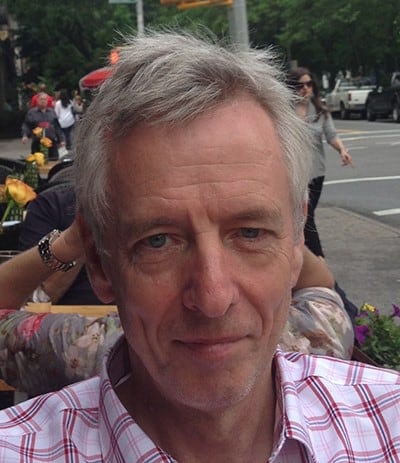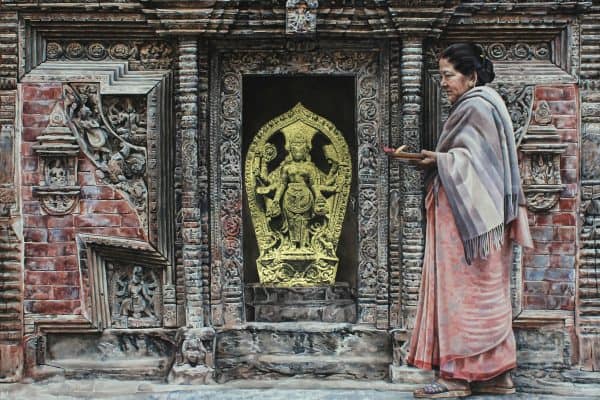Neil Brodie to Keynote Conference on “The Ethics of Acquiring Cultural Heritage Objects”
“Central to this interdisciplinary inquiry—which brings together the fields of anthropology, archaeology, art, art history, economics, ethics, law, religion and museum studies—is the issue of ethics.”
Exhibit on the Theft of Nepal’s Sacred Sculptures in Staniar Gallery Up until Mar. 17
Neil Brodie, senior research fellow in Endangered Archaeology in the Middle East and North Africa at the University of Oxford, is the keynote speaker for the Mudd Center for Ethics’ interdisciplinary conference on “The Ethics of Acquiring Cultural Heritage Objects” at Washington and Lee University.
Brodie’s lecture will kick off the conference at 5 p.m. on March 2 in Stackhouse Theater. He will speak on “Controlling the Globalized Market in Cultural Object: Closing the Gap Between Law and Ethics.” His talk is free and open to the public.
Staniar Gallery is partnering with the Mudd Center to host an exhibition that is part of the conference. The show, “Remembering the Lost: Community Responses to the Theft of Nepal’s Sacred Sculptures,” will be on view in Staniar Gallery from Feb. 9-March 17.
The artist, Joy Lynn Davis, uses photos, paintings, research and interviews to document the community reaction to the theft of sacred stone sculptures from the Kathmandu Valley of Nepal. She is one of the conference speakers.
For more information about the conference and to register, please see https://www.wlu.edu/mudd-center/programs-and-events/2016-2017-markets-and-morals/conference-on-the-ethics-of-acquiring-cultural-heritage-objects. Click on the free registration (for a head count only).
Brodie, an archaeologist by training, has been researching the illicit trade in cultural objects since 1997. He has worked on archaeological projects in the United Kingdom, Greece and Jordan, and he continues to work in Greece.
“International regulatory policy aimed at protecting cultural heritage seems to be floundering,” said Brodie. “Whether taken remotely by satellites or close-up with cell phones, images of looted landscapes in Syria tell the same story – widespread destruction of cultural heritage is an ever-present accompaniment to conflict and is out of control. The carefully worked out systems of legal and normative regulation developed since the middle years of the 20th century seem unable to cope, overwhelmed by the liquid reality of the twenty-first century market.”
His publications include “The Internet Market in Antiquities” (2015), which appeared in “Countering Illicit Traffic in Cultural Goods: The Global Challenge of Protecting the World’s Heritage”; “Aramaic incantation Bowls in War and in Peace” (2014), in Journal of Art Crime; and “The Antiquities Market: It’s All in a Price” (2014), in Heritage and Society.
Brodie’s current research interests are cultural, criminal and economic aspects of the illicit trade in cultural objects; the failure of international public policy to suppress trade; novel regulatory solutions; and the legal and ethical contexts of scholarly engagement with illicitly traded cultural objects.
The March 3 conference on the “Ethics of Acquiring Cultural Heritage Objects” will look at the ethical and cultural heritage concerns surrounding the looting and trafficking of art objects in the Middle East, South Asia and the West.
“Central to this interdisciplinary inquiry—which brings together the fields of anthropology, archaeology, art, art history, economics, ethics, law, religion and museum studies—is the issue of ethics,” said Melissa Kerin, assistant professor of art history at W&L and co-organizer of the conference. “Conference participants will examine, from a multitude of perspectives, ethical matters related to systems and networks of trade in conflict antiquities, policies and practices of protection, rightful stewardship, repatriation, and digitally and artistically re-imaged cultural heritage sites and objects. The conference provides an opportunity to parse the many intertwined layers related to cultural heritage and its ethical treatment.”
The speakers included in the conference are:
- Salam al Kuntar, visiting assistant professor of anthropology, Penn Cultural Heritage Center;
- Chip Colwell, senior curator of anthropology, Denver Museum of Nature and Science;
- James Cuno, president and CEO, J. Paul Getty Trust;
- Joy Lynn Davis, artist, “Remembering the Lost Sculptures of Kathmandu”;
- Domenic DiGiovanni, Port of Newark Customs and Border Protection Officer (ret.);
- Morag Kersel, assistant professor of anthropology, DePaul University;
- Shikha Silwal, assistant professor of economics, Washington and Lee University;
- Erin Thompson, assistant professor of art crime, John Jay College of Criminal Justice
 Neil Brodie
Neil Brodie 15th Century Lakshmi Narayan, Patan, Nepal; 2013; acrylic with 23 karat gold on cotton rag paper; 40 x 30 in.
15th Century Lakshmi Narayan, Patan, Nepal; 2013; acrylic with 23 karat gold on cotton rag paper; 40 x 30 in.
You must be logged in to post a comment.